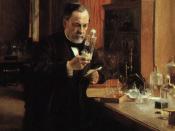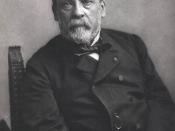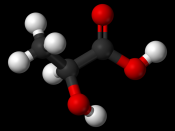His discoveries have saved countless lives and created new technologies from which the world can profit. Among his discoveries are the pasteurization process, and ways of preventing silk worm diseases, anthrax, chicken cholera and rabies.
He received a degree of bachelor of letters from the College Royale de Besancon.
For the next three years he tutored younger students and prepared for the Ecole Normale Superieure, a teacher training college in Paris.
He was quickly appointed as an assistant professor of chemistry. By 1854, Pasteur's work had gotten him appointed the dean of the school of science at the University of Lisle.
Pasteur saw that fermentation was not a simple chemical reaction, but took place only in the presence of living organisms.
In 1857 Pasteur published his first paper on the formation of lactic acid and its function in souring milk.
In years to come, most of Pasteur's efforts went towards convincing other scientusts that germs do not originate spontaneously in substances, but enter from the outside.
His work in understanding the functioning of bacteria led him to find a cure for a mysterious disease that was attacking silk worms and he discovered the concept of immunization in his work with curing anthrax. He later ventured to use the same immunization process on humans to prevent rabies that he used on cattle to prevent anthrax and was tremendously successful. Pasteur was a scientific genius whose discoveries have most likely extended all of our lives through disease prevention.



Pasteur
You make some interesting points in your biography of one of the most famous scientists in history. Louis Pasteur's contributions to science were so important that they affect our lives even today. I noted that your paragraphs tended to be short and you may want to expand on them. Pasteur was such an eminent scientist that many others would probably want to read more about him also. Nice effort!
5 out of 5 people found this comment useful.